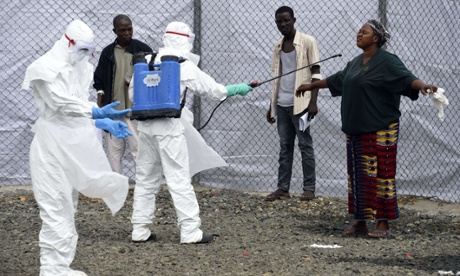What is it? How is it transmitted? What are the symptoms? Is there a cure?

What is Ebola?
Ebola is a serious, often fatal, disease. The virus is transmitted to people from animals and then spreads among humans through direct contact with an infected person.
There are five strains of the Ebola virus, but only four are known to cause disease in humans. The Ebola virus, which was first discovered in the Democratic Republic of Congo (then known as Zaire) in 1976, is found in various African countries. Periodic outbreaks have occurred since Ebola’s discovery, but the current west Africa outbreak, which began in Guinea in March 2014, is the largest and deadliest in history.
What is direct contact?
Direct contact means that body fluids from an infected person or body have touched another person’s eyes, nose or mouth or an open cut, wound or abrasion. It can also be contracted from contaminated surfaces and materials, including bedsheets and clothing.
What are body fluids?
Body fluids include saliva, mucus, vomit, faeces, sweat, tears, breast milk, urine and semen.
Can you get Ebola from sneezing?
It is possible to spread through coughing or sneezing, but health officials say it’s unlikely. Saliva or mucus from an infected person would have to get into a healthy person’s eyes, nose or mouth for the disease to spread.
What are the symptoms?
The most common symptom is a high fever, typically greater than 101.5F (38.6C). Other symptoms can include severe headaches, diarrhoea, vomiting, abdominal pain and, in serious cases, internal or external bleeding.
Symptoms of the virus appear between two and 21 days after exposure, but typically after eight to 10 days.
Can it spread through mosquitoes?
There is no evidence to support this. Humans, bats, monkeys and apes have the ability to spread the Ebola virus, but evidence so far indicates that mosquitoes and other insects can’t transmit it.
Is it airborne?
Not currently.
Can it mutate to become airborne?
While mutations do occur, experts say it is very unlikely that the virus would mutate to become an airborne disease.
The Ebola virus has not previously mutated in this manner, and experts say there is no other virus that has transformed from non-airborne to airborne in human beings.
Testifying before Congress in September, Anthony Fauci, director of the National Institute of Allergy and Infectious Diseases, said this is not something the American people should “lose sleep over”.
Is there a cure? What about a vaccine?
No, but the race is on to find both. An experimental Ebola drug, Zmapp, has been used to treat a handful of patients, including two American missionaries. It’s unclear without proper testing what role, if any, the drug played in the patients’ recovery.
A number of experimental drugs, including Zmapp, are being rushed into trials, but even so, experts say it could take months, even years, to produce enough of the drugs to make a difference in the current outbreak.
Human testing recently began on an Ebola vaccine, but it would only help protect people who haven’t yet contracted the virus, not those already infected.
At this time, the difference between life and death in an Ebola-stricken patient can come down to very basic interventions: keeping the person hydrated, maintaining their oxygen and blood pressure, and mitigating the effects of other infections that can further weaken the body’s immune system.
People who recover from Ebola can no longer spread the virus.
Why are people allowed to travel from infected areas to the US?
The US Centres for Disease Control and Prevention director, Tom Frieden, said isolating affected countries would only make the epidemic worse. He said it would constrict the flow of necessary aid to these counties, which would in turn make the outbreak that much more difficult to stop.
There are checks in place to try to prevent infected people from travelling outside of the affected countries. When departing affected countries, travellers fill out a questionnaire that ask about their exposure history to Ebola. Passengers are also checked for fever before boarding a flight. International airports around the world have quarantine areas in case a person becomes ill while travelling.
That being said, it’s difficult to enforce this as people often don’t know they’ve contracted the virus until days – even weeks – after being exposed. There is also a lot of misinformation circulating through west Africa about the disease, so people may not be certain if they were exposed, or may fear disclosing exposure because of the stigma attached to the disease.
Based on information from the US Centres for Disease Control and Prevention the World Health Organisation
